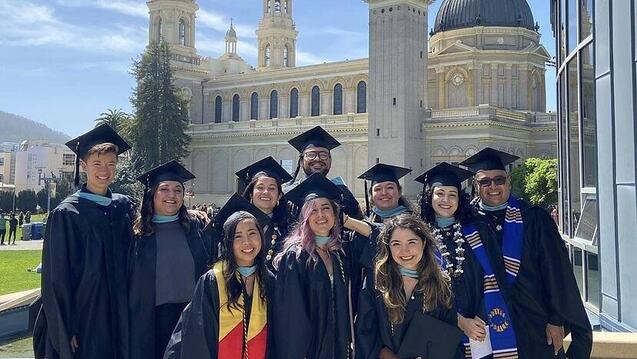University of San Francisco Professor Aparna Venkatesan Featured on Increasing Congestion in Low Earth Orbit and Stewardship of Space as Shared Heritage
SAN FRANCISCO (March 22, 2023) – Published this week in the journal Nature Astronomy, two articles by Dr. Aparna Venkatesan, professor of physics and astronomy and the co-director of the Tracy Seeley Center for Teaching Excellence at the University of San Francisco (USF), and her collaborative team call for action on the rapidly increasing congestion in Low Earth Orbit (LEO). They present the first published calculations of the aggregate effects of satellites and space debris on LEO on major ground-based astronomy research facilities, finding that they could lead to an increase in brightness of the night sky of about 12% during the 2020s, including planned satellite launches. This increase would brighten the sky globally and be inescapable anywhere on the planet.
In the research Perspective titled ‘Aggregate effects of proliferating low-Earth-orbit objects and implications for astronomical data lost in the noise’, authors John C. Barentine, Dr. Venkatesan, Jessica Heim, James Lowenthal, Miroslav Kocifaj and Salvador Bara note that “the broader loss of dark skies for humanity is essentially incalculable”, with implications for environmental degradation in LEO, cultural sky traditions worldwide, and ecological systems reliant on dark skies including migratory species and circadian rhythms.
As Dr. Venkatesan notes in her single-author Worldview article in Nature Astronomy titled ‘Stewardship of space as shared environment and heritage’, “Astronomers study ancient objects with groundbreaking data, most recently from JWST. But just as worthy is our ancient relationship with the night sky. Space is our shared heritage and ancestor — connecting us through science, storytelling, art, origin stories and cultural traditions — and it is now at risk.”
Brighter night skies mean longer exposures through telescopes are necessary to see distant objects in the cosmos. The study finds that reflected light from objects in LEO may add an extra $22 million to the cost of a flagship night sky survey. This would imply fewer scientific projects funded annually, and could lead to a potential loss of new scientific discoveries. Access to observational programs would also become even more intensely competitive than they are today, concentrating scientific privilege even further at a few institutions, and undermining DEI efforts for the astronomy workforce.
Globally coordinated regulatory policies and mitigation strategies are among the urgent next steps to avoid a preventable disaster in LEO, so we can protect this shared environment and intangible heritage of humanity.
Full texts of the articles are available via these links:
- A. Venkatesan (2023): Worldview titled “Stewardship of space as shared environment and heritage”
- Barentine+ (2023): Perspective titled “Aggregate effects of proliferating LEO objects and implications for astronomical data lost in the noise”
Media Enquiries
Dr. Aparna Venkatesan
Professor, Department of Physics and Astronomy
Co-Director of the Tracy Seeley Center for Teaching Excellence
University of San Francisco
avenkatesan@usfca.edu
Tel.: +1-415-609-1682
About the University of San Francisco
The University of San Francisco is a private, Jesuit Catholic university that reflects the diversity, optimism, and opportunities of the city that surrounds it. USF offers more than 230 undergraduate, graduate, professional, and certificate programs in the arts and sciences, business, law, education, and nursing and health professions. At USF, each course is an intimate learning community in which top professors encourage students to turn learning into positive action, so the students graduate equipped to do well in the world — and inspired to change it for the better. For more information, visit usfca.edu.


